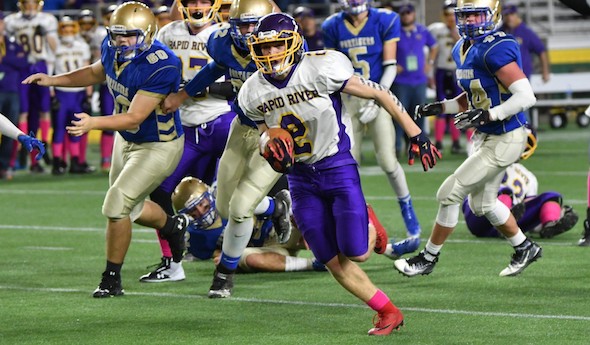
Rapid River Rumbles to History-Making Finish
November 17, 2018
By Geoff Kimmerly
Second Half editor
MARQUETTE – Since the opening kickoff of 8-Player Football Playoffs in 2011, Rapid River has been on the verge of winning its first MHSAA Finals championship in this sport.
In that first year’s title game, also at Northern Michigan University’s Superior Dome, the Rockets fell to Carsonville-Port Sanilac. The next year saw a Semifinal run. And then in 2013 at Greenville’s Legacy Field, another title game defeat, to Peck.
Four seasons of earlier-round playoff losses followed. But all of those are more distant memories after Saturday.
Rapid River hoisted its first championship trophy in football after a 30-18 win over Onekama back at the Superior Dome in the 8-Player Division 2 Final.
“It’s my senior year. Our coach has been here twice, but never won it. To get him one before he would retire … (we) did it for all the people on my team,” Rockets senior Gunner Larson said. “Just an amazing experience. Gotta go for the ride.”
Just a quick note: Rapid River coach Steven Ostrenga didn’t announce his retirement after his 20th season running the program came to a close. But Larson and his teammates know it will happen someday – but now without the “what if” of just missing out on a championship.
Rapid River and Onekama both earned their first trophies of 2018 during the playoffs after both finished third in their respective leagues, Onekama behind two contenders for the Division 1 title and Rapid River behind Division 1 runner-up Pickford and Engadine, which the Rockets then beat in the first round by two points after falling to the Eagles by 18 only two weeks prior.
And Rapid River certainly played like a champion Saturday, relying on its strengths especially up front to outgain Onekama 341-212 in yardage – but more importantly, hold onto the ball for 33½ minutes to the Portagers’ 14:30.
The Rockets ran 66 times for 305 yards as a team, with junior Tyler Sundling gaining 123 and scoring two touchdowns and Larson running for 107 and a score. Senior quarterback Brent Lundquist tossed a 14-yard touchdown pass to senior Nate Olson during a change of pace.
Rapid River carried a 22-8 lead into the fourth quarter and held on despite two Onekama scores over the final 12 minutes.
“We’ve never given up that many yards rushing and that many points,” said Onekama coach John Neph, whose defense was allowing only 8.1 points per game entering the day. “So I think that speaks to the quality of the Rapid River offensive line and their backs. They’re flying around and doing some good things defensively, and that was a huge difference.
“We never thought we were out of the game till maybe the last touchdown there that the Rockets had. We hung in and hung in, and the offense kinda left the defense out there way too long. (And) the conversions they could get on third and fourth down were just critical to keep the drives going.”
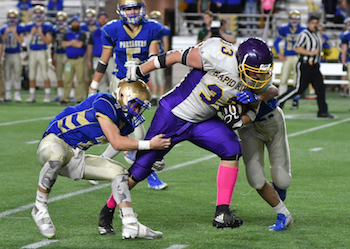 Rapid River didn’t have a turnover and only six penalties. Onekama had five penalties but also lost two fumbles. And those Rockets conversions clearly were difference makers; Rapid River was 10 of 17 on third down and 4 of 6 on fourth, while Onekama was 4 of 10 on third downs and didn’t have a fourth down try.
Rapid River didn’t have a turnover and only six penalties. Onekama had five penalties but also lost two fumbles. And those Rockets conversions clearly were difference makers; Rapid River was 10 of 17 on third down and 4 of 6 on fourth, while Onekama was 4 of 10 on third downs and didn’t have a fourth down try.
“Every team that we have is unique. We had a lot of good football teams; other teams were just a little bit better than us in those games,” Ostrenga said of past playoff trips. “We made some mistakes today, but we were almost mistake-free. And that’s the key.”
He threw plenty of credit to his assistants for getting the team ready, to his linemen for their work up front, and to a host of other coaches – including one in basketball – who had influenced and taught him some things over the years. Ostrenga also has led his share of champions, including eight Upper Peninsula Finals winners in boys track & field.
And at the same time Saturday, it felt like Onekama could be following a similar path and only a few steps behind.
This championship game was the first in football for the Portagers, who are 19-5 over two seasons in 8-player after making the playoffs their last three seasons with 11 on the field.
Onekama will graduate some key contributors including running back/linebacker Ben Acton, who ran for 78 yards and a touchdown and also had a team-high 16 tackles including three for losses.
But the Portagers should also bring back 14 of 19 players next fall, including junior quarterback Luke Mauntler (188 yards, two touchdown passes Saturday) and junior tight end Wade Sedlar, who with senior tight end Rylan Clarke caught those scoring tosses.
Juniors Matthew Mallison and Taylor Bennett followed Acton with 15 and 13 tackles, respectively.
“We have five seniors, but we do have 11 juniors coming back,” Neph said. “So we’re hoping we can replicate this. It’s absolutely tasking on a team to repeat and get this far. There’s some outstanding teams we were able to overcome to get this far. We’d love to come here again, but it’s going to be a ton of hard work and effort moving forward.
“But again, this is an historic season for our program. The guys going to the state finals was just a dream come true for all of us.”
PHOTOS: (Top) Rapid River's Tyler Sundling (2) breaks several tackles and scores a touchdown Saturday. (Middle) Rapid River's Gunner Larson (33) is taken down by Onekama's Luke Mauntler (7) and Ben Johnson (12). (Photos by Cara Kamps.)
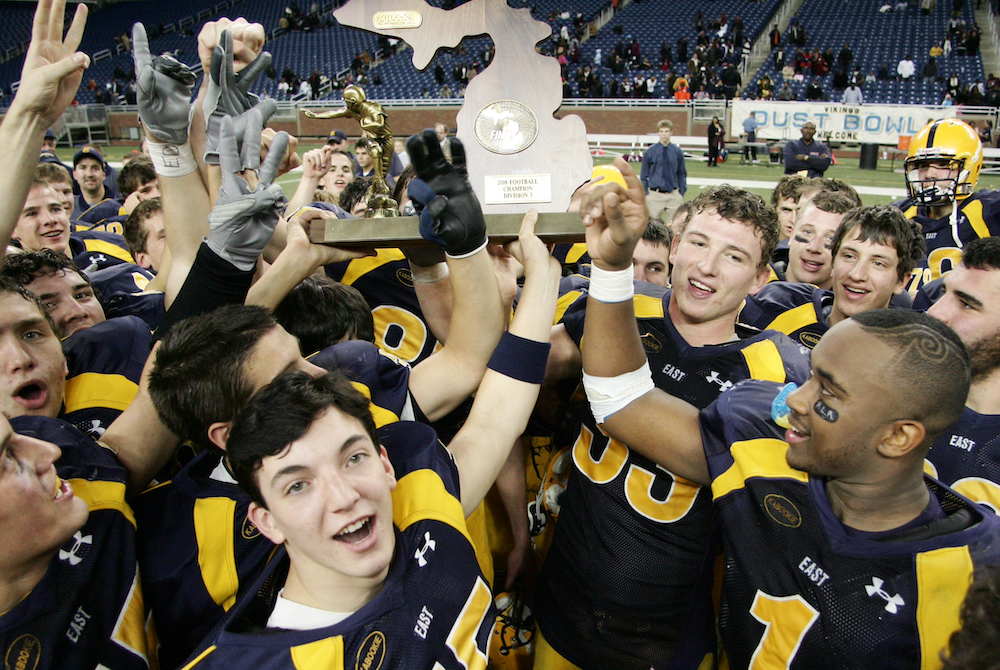
EGR 5-Year Title Run Remains Awe-Inspiring, Product of More Than Talent Alone
By
Steve Vedder
Special for MHSAA.com
November 25, 2022
It was Peter Stuursma's first year at East Grand Rapids and while the wolves weren't necessarily knocking at the door, they were definitely on the prowl.
The tradition-rich Pioneers football team had slumped to an uncharacteristic 3-6 record in Stuursma's first season as varsity head coach in 2000, and there were subtle signs a community used to winning was growing restless with the program's direction.
That's when Stuursma bumped into one of his players coming out of the weight room, and the two had a quick conversation which he clearly remembers 22 years later.
"It was this senior offensive lineman and all he said was, 'Don't worry about it Coach, it's not going to happen again. We got this,’" Stuursma said. "We had just gone 3-6, and I'm wondering how we're going to get this going and that they might get rid of me. You never underestimate what people can do."
East Grand Rapids, under legendary coach George Barcheski, had been the dominant football program in West Michigan with 28 winning seasons over 29 from 1970-99, and 38 victories in 39 games from 1993-95, along with Class B championships in 1976 and 1983. After Stuursma replaced the retiring Barcheski,, some in the community were expecting more of the same when it came to success.
Those fans never dreamed what they would see as the Pioneers promptly pieced together arguably the greatest decade-long stretch in Michigan high school football history – and without doubt one of the most incredible five-year runs of dominance.
Even that optimistic offensive lineman couldn't have imagined a remarkable 126-7 record over the next 11 years, a 40-3 MHSAA Tournament mark and seven Finals championships. Five of those titles (2006-10) came in a row, a feat accomplished just three times in the now 46-year history of the playoffs.
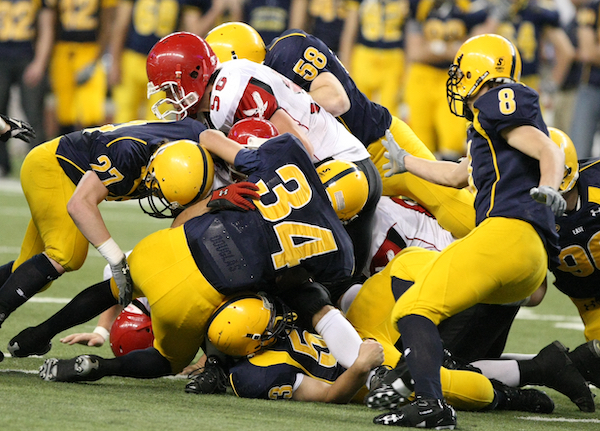 The five straight championships were part of an amazing era that Stuursma and his players say has not diminished with time. They recall no single factor explained going 67-3 overall over those five seasons. There was talent, obviously, but coaching, tradition, confidence and strength of community all played vital parts. There were Thanksgiving practices attended by hundreds of former football alumni, dedicated fan support that included playing before more than 30,000 fans at least twice at Ford Field, and a program-wide attitude that, while some may call it a cliché, proved that success did indeed breed success.
The five straight championships were part of an amazing era that Stuursma and his players say has not diminished with time. They recall no single factor explained going 67-3 overall over those five seasons. There was talent, obviously, but coaching, tradition, confidence and strength of community all played vital parts. There were Thanksgiving practices attended by hundreds of former football alumni, dedicated fan support that included playing before more than 30,000 fans at least twice at Ford Field, and a program-wide attitude that, while some may call it a cliché, proved that success did indeed breed success.
"I'm in awe of the scope of things," said Stuursma, whose team used back-to-back Division 3 championships in 2002-03 as a springboard to later success. "Because we had won a couple times before it just started to feel normal. We had such support the community used to think Thanksgiving break ended at Ford Field."
EGR teams would find all kinds of ways to win during the five-year title stretch. The 2009 team, for instance, barreled through its first four playoff opponents by a combined score of 164-29 until a 24-21 win over Orchard Lake St. Mary’s in the Final. The 2010 team had to win three playoff games by eight points or fewer to finish off its perfect 14-0 record. And then there was the wild 46-39 five-overtime win over St. Mary's in the 2007 Final during which the Pioneers had to score on all five possessions in overtime to outlast the Eaglets.
While teams always seemed to find ways to get the victory, former players remember what it was like to be part of a seemingly endless tradition of success on the football field.
"One of the things that was so special about East Grand Rapids were the expectations," said Luke Glendening, a running back on the 2006 team who has gone on to a long NHL career with the Detroit Red Wings and Dallas Stars. "During the game I'd look around and see guys who had played here a long time ago. I viewed it as a privilege to have the opportunity to play before the alumni and community."
Quarterback Ryan Elble, who completed a combined 34 passes for 483 yards and seven touchdowns during the 2008 and 2009 Finals, also used the word "honored" to describe his high school experience.
"The culture was to win. Coach Stuursma made it fun, and it always seemed to take shape on the field," said Elble, who went on to play baseball at Miami (Ohio) "I think each team had different skill sets, but at the end of the day it was our culture and putting in the work to spend Thanksgiving weekend at Ford Field."
The players point to that winning culture over talent. Elble said he played with only one eventual Division I college player in linebacker/running back Trent Voss, who went on to Toledo. Nobody wins without talent, of course, but they point to many other factors as being just as critical. Because EGR coaches would always work juniors into the lineup, Stuursma said the program faced only one major rebuild, in 2007. That team wound up 13-1 and the second of those five straight champions.
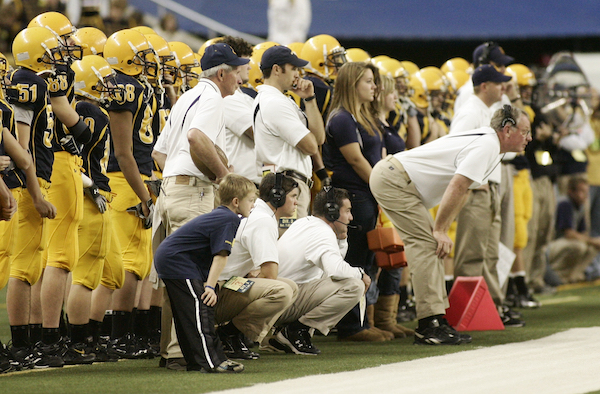 "We had some incredible players," said Stuursma, who left EGR in 2016 to lead Hope College to two Michigan Intercollegiate Athletic Association titles, three second-place finishes and a 46-15 overall record over his seven seasons. "We returned only two starters (in 2007), but we still had good guys who wanted to win."
"We had some incredible players," said Stuursma, who left EGR in 2016 to lead Hope College to two Michigan Intercollegiate Athletic Association titles, three second-place finishes and a 46-15 overall record over his seven seasons. "We returned only two starters (in 2007), but we still had good guys who wanted to win."
The players say the culture started with Barcheski and the program's tradition. As Hope College's coach, Stuursma said there’s a similar common thread among schools he sees on recruiting visits: a winning tradition that, in Stuursma's words "screams excellence," from every corner of the building. He sees it the minute he walks into some schools, and East Grand Rapids had the same culture before he arrived. The past players say it played a major part in their careers.
That tradition didn't start with the five straight titles, said former quarterback Kyle Cunningham, who played on the 2002-03 teams and went 46-0 over four years from his freshman to senior seasons. Those two championship teams’ most recognizable player was running back Kevin Grady, who still holds multiple MHSAA records including for career rush yardage and went on to play at University of Michigan.
"We worked hard and had a lot of pride," he said. "I remember watching film of earlier teams, and I remember hoping our team could stand up the same way."
While the players point to tradition and community, Ryan Blair, a tight end/defensive tackle on the 2006-08 champion clubs, said talent remained critical – but EGR was outmanned physically in some of those title games. That's when camaraderie and the confidence that someone was going to make a key play took over. The Pioneers' remarkable run was teeming with such plays.
"Certainly we were never one of the biggest teams there, we never had a big size advantage in any game," he said. "But we had this camaraderie on every team. We had guys who really liked playing with each other. When things got tight we stuck together, and we'd fight to the fourth quarter or beyond."
Despite the long odds of winning a single state title let alone repeating, Stuursma believes there could be a team one day which wins six straight. That team will have the same characteristics of those EGR teams – the talent, coaching, tradition and fortune of catching timely breaks – but it can be done, he said.
"Absolutely," Stuursma said. "The only record I can think of that won't be broken is Wayne Gretzky's (NHL) scoring record. It will take a lot, but records are made to be broken. I think high school football is on the upswing and there would have to be an emphasis on winning. You would have to have a good path to get there, but I can see someone getting six one day."
PHOTOS (Top) East Grand Rapids celebrates its third-straight Division 3 championship win in 2008. (Middle) Pioneers converge on an Orchard Lake St. Mary’s ball carrier during the 2007 five-overtime title decider. (Below) EGR coach Peter Stuursma, kneeling center, monitors the action during the 2010 championship game.

